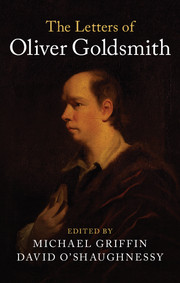9 - To Robert Bryanton, London, 14 August 1758
Published online by Cambridge University Press: 12 December 2024
Summary
The copy-text is the manuscript in the Royal Irish Academy in Dublin. It was first published by Prior in 1837. It is addressed ‘To | Robert Bryanton Esqr At | Ballymahon | Ireland.’ It is postmarked 15 and 17 August.
Balderston uses Prior's copy of this letter, a transcript of the original manuscript given him by the owner, the Reverend Robert Handcock (1770–1848), of Dublin. Prior, and thus Balderston, introduced paragraphing, punctuation and other emendations which were not in the original, which have been reversed below, though we have taken Prior as our guide where the text is worn away. The Hibernian Chronicle (1 Jan. 1795) reported that Handcock, of Marlborough Street, Dublin, had recently married a Miss Bryanton of Frederick Street, Dublin. Robert Handcock was, thus, Robert Bryanton's son-in-law. Prior notes ‘that portions of the paper being worn away by time, a few sentences now imperfect, are attempted to be supplied from the context, and it is hoped, with a near approach to accuracy. The passages thus introduced are inclosed within brackets’ (P, I: 263). His suggestions for illegible passages are retained here.
Dr. Sir.
I have heard it remark’d, (I believe by yourself), that they who are drunk or out of their wits fancy every body else in the same condition; Mine is a friendship that neither distance nor time can efface, which is probably the reason that for the soul of me I can't avoid thinking yours of the same complexion; and yet I have many reasons to be of a contrary opinion, else why in so long an absence was I never made a partner in your concerns, to hear of your successes would have given me the utmost pleasure; and a communication of your very disappointments would divide the uneasiness I too frequently feel for my own; indeed my Dear Bob you don't conceive how unkindly you have treated one whose circumstances afford him few prospects of pleasure except those reflected from the happiness of his friends. However, since you have not let me hear from you I have in some measure disappointed your neglect by frequently thinking of you. Every day do I ruminate the calm anecdotes of your life from the fire-side to the easy chair;
- Type
- Chapter
- Information
- The Letters of Oliver Goldsmith , pp. 28 - 31Publisher: Cambridge University PressPrint publication year: 2018

